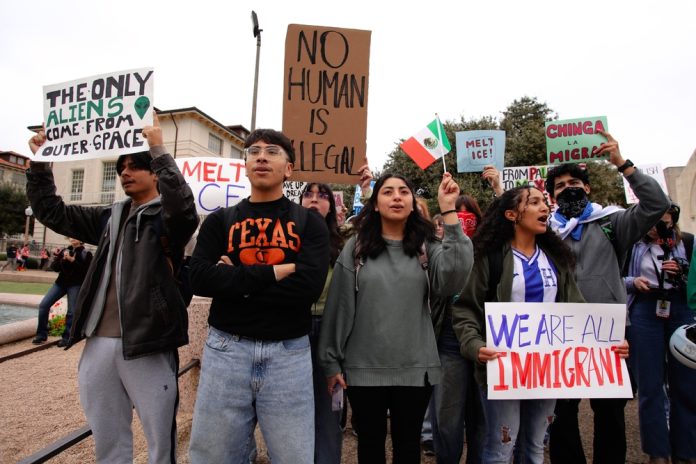
President Trump directs ICE to target Democratic-led sanctuary cities in a political enforcement shift that has governors and military leaders clashing over jurisdiction rights in unprecedented ways.
Key Takeaways
- Trump has ordered ICE to pause worksite enforcement in agriculture, restaurants, and hotels while redirecting resources to target sanctuary cities like Los Angeles, Chicago, and New York
- Republican-led states including Florida, Texas, and Virginia are actively cooperating with federal immigration enforcement, while Democratic states like California view these actions as partisan warfare
- The administration’s federalization of National Guard units and planned deployment of Marines to assist ICE operations in Los Angeles has been characterized by critics as an “armed takeover”
- Agriculture Secretary Brooke Rollins has successfully lobbied for protections for farmworkers, highlighting tensions within the administration’s deportation strategy
- Southern states with Democratic-leaning cities are facing more aggressive deportation efforts through 287(g) agreements that allow local law enforcement to act as immigration agents
Trump’s Strategic Pivot in Immigration Enforcement
President Trump’s administration has made a significant shift in its mass deportation strategy, directing Immigration and Customs Enforcement (ICE) to focus on Democratic-led sanctuary cities while easing enforcement in key economic sectors. This pivot comes as industries crucial to the American economy, particularly agriculture and hospitality, have raised serious concerns about workforce disruption. The administration has explicitly instructed ICE to pause worksite enforcement investigations in agriculture, restaurants, and hotels, signaling a recognition of economic realities while maintaining a tough stance on illegal immigration in urban centers.
Internal communications reveal ICE field office directors received clear instructions from Acting Executive Associate Director Tatum King: “please hold on all worksite enforcement investigations/operations on agriculture (including aquaculture and meatpacking plants), restaurants, and operating hotels.” This directive demonstrates the administration’s attempt to balance enforcement priorities with economic concerns, particularly in sectors heavily reliant on immigrant labor. Agriculture Secretary Brooke Rollins has emerged as an influential voice within the administration, successfully advocating for protections for farmworkers.
Geographic Focus: Democrat Cities in the Crosshairs
President Trump has made it clear that his administration’s enforcement efforts will target major Democratic-led cities like Los Angeles, Chicago, and New York. This geographic prioritization reflects the administration’s view that these jurisdictions have used illegal immigration for political advantage. Senior advisor Stephen Miller reportedly questioned ICE officials about their enforcement priorities, asking: “Why aren’t you at Home Depot? Why aren’t you at 7-Eleven?” This confrontational approach underscores the administration’s determination to challenge sanctuary policies that limit cooperation with federal immigration authorities.
“Why aren’t you at Home Depot? Why aren’t you at 7-Eleven?,” said Stephen Miller, Senior Advisor to President Trump New York Magazine.
The enforcement strategy appears to follow political fault lines, with Republican governors like South Dakota’s Kristi Noem describing Los Angeles as a “city of criminals.” Meanwhile, California officials view the increased ICE presence and potential military deployment as partisan warfare rather than legitimate law enforcement. Southern states with Democratic-leaning cities are experiencing particularly intense enforcement activity, facilitated by 287(g) agreements that allow local law enforcement to function as deputized immigration agents.
Military Support: Crossing Traditional Boundaries
Perhaps most controversial is the administration’s move to involve military assets in immigration enforcement. The federalization of National Guard units and the planned deployment of Marines to Los Angeles represents an extraordinary escalation in enforcement tactics. Critics have characterized these actions as an “armed takeover” of sanctuary jurisdictions, while supporters view them as necessary measures to restore law and order. This unprecedented use of military resources for domestic immigration enforcement raises serious questions about appropriate boundaries between military and civilian law enforcement.
“city of criminals,” said Kristi Noem, Governor of South Dakota New York Magazine.
The contrast in enforcement approaches between Republican and Democratic states could not be starker. Florida, Texas, and Virginia have embraced cooperation with federal immigration authorities, while California has reinforced its sanctuary policies. This divergence highlights the increasingly partisan nature of immigration enforcement, with local jurisdictions either aligning with or resisting federal priorities based largely on political affiliation. As ICE operations intensify in Democratic-leaning cities, the potential for confrontation between federal and local authorities continues to grow.
Political Calculations and Public Response
President Trump’s enforcement strategy appears designed to deliver on campaign promises to his base while accommodating economic realities. The exemption of agricultural and hospitality workers from enforcement priorities reflects a pragmatic recognition of workforce needs, even as the administration projects toughness through high-profile operations in sanctuary cities. However, public opinion on immigration enforcement remains divided, with the president’s approval rating on immigration issues underwater despite strong support from his core followers.
The overt politicization of immigration enforcement risks undermining public confidence in the neutrality of law enforcement institutions. By explicitly targeting Democratic jurisdictions while easing enforcement in key economic sectors, the administration has created a patchwork approach that appears driven more by political calculations than consistent application of immigration law. As protests against ICE raids spread across major cities, the administration faces the challenge of maintaining public support for its enforcement priorities while addressing legitimate concerns about selective enforcement and economic disruption.





